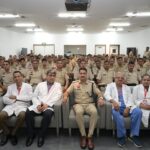A known diabetic, patient recovers despite lack of oxygen supply to the brain for 10 minutes and “Zero” blood pressure
New Delhi, September 24, 2017: In a miraculous turn of events, a team of doctors led by Dr S N Khanna, Associate Director, Cardiac Surgery, Fortis Escorts Heart Institute, recently witnessed a patient who could clinically be termed as ‘dead’ come back to life completely unscathed and normal.
Patient Saraswati Devi, 50 years of age, a diabetic who had undergone a stenting procedure a few months ago began experiencing chest pains recently, following which she came to Fortis Escorts Heart Institute for a regular check – up. The angiography report showed that the cardiac condition had worsened and the patient needed an urgent bypass procedure. On the August 14th the patient was being prepped for surgery. However, when she was wheeled into the operation theater, she suffered from a massive heart attack and her blood pressure plummeted to zero.
The doctors immediately began to administer CPR (cardiopulmonary resuscitation). This helped ensure that the blood and oxygen circulation continued however the patient still didn’t show any signs of revival. CPR was administered for 20 minutes after which the doctors decided to take a leap of faith and continue with the bypass surgery. As the anesthesia team pressed into action and put in IV lines, cardiac massage could not be continued constantly. Once the lines were put in, the challenge was to reach the heart which would have meant a time lag of at least 20 minutes from sterilization of the surgical site to opening up the chest cavity through a process called, ‘sternotomy’ (vertical incision is made along the sternum or the rib cage, after which the sternum itself is divided to reach the heart). However, the team hurried the procedure and managed all in 10 minutes flat. It was for these ten minutes that no massage was conducted and that the heart beat and blood pressure was zero. The oxygen supply to the organs was also completely cut off and in effect the patient could have suffered irreparable and irreversible loss to the cells.
Dr Khanna said, “We had to work fast as we needed to ensure that the brain does not go without oxygen supply for too long. Medically a person is declared brain dead if the oxygen has not reached the brain for four minutes. In this case oxygen did not reach the brain for 10 minutes. Therefore the fear was that patient would suffer from severe brain impairment. After the chest cavity was opened we put the patient on a cardio-pulmonary bypass to ensure circulation. It was after this that we proceeded and completed the bypass surgery. We were extremely apprehensive about the condition the patient would be in when she woke up but there was no untoward damage to her brain functions. It was nothing short of a miracle.”
Dr Kousar Ali Shah, Zonal Director, Fortis Escorts Heart Institute said, “While the bypass surgery was successful overall, we were worried there could be issues arising in awaking the patient from anaesthesia or thereafter due to substantial lag in oxygen supply to her brain. However, her post-operative recovery was uneventful and she was extubated almost as any normal patient who would have undergone a bypass surgery. Both the cardiac surgery and anaesthesia team worked in tandem to save a precious life. A case as this in the first place is rare to be even taken up for surgery post an arrest followed by an unresponsive resuscitation. I congratulate the doctors and the support staff for their perseverance and success. Saraswati Devi was discharged from the hospital on August 24th and has returned back home to Sonebhadra district in Uttar Pradesh.”
Brain cells are very sensitive to a lack of oxygen. Some brain cells start dying less than 5 minutes after their oxygen supply disappears. As a result, brain hypoxia can rapidly cause severe brain damage or death. The brain can survive for 4 minutes without oxygen, then brain cells start dying. So if there is no heartbeat, the heart is not contracting, the blood is not circulating through the body, and there is no oxygen supply. Other tissues and organs can live longer without oxygen.







